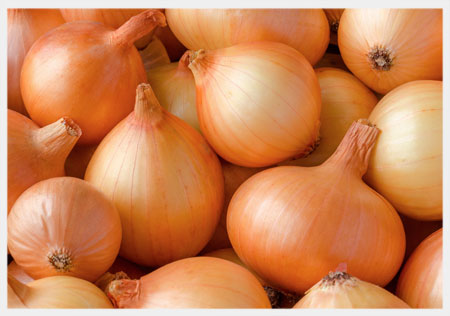Onion

Vegetable Onions
Red onions, sometimes called purple onions, are cultivars of the onion with purplish red skin and white flesh tinged with red.
These onions tend to be medium to large in size and have a mild to sweet flavor. They are often consumed raw, grilled or lightly cooked with other foods, or added as color to salads. They tend to lose their redness when cooked. Red onions are available throughout the year. The red color comes from anthocyanidins such as cyanidin. Red onions are high in flavonoids.[1] They can be stored 3 to 4 months at room temperature.[2Benefits
What would life be like without onions? The onion has been used as an ingredient in various dishes for thousands of years by many cultures around the world. World onion production is steadily increasing so that onion is now the second most important horticultural crop after tomatoes. ‘VELAN HOME FOOD’ which are all not only delicious but also a complete authentic Indian dish.
There are many different varieties of onion, red, yellow, white, and green, each with their own unique flavor, from very strong to mildly sweet. Onions can be eaten raw, cooked, fried, dried or roasted. They are commonly used to flavor dips, salads, soups, spreads, stir-fry and other dishes.
Onions (Allium cepa) belong to the lily family, the same family as garlic, leeks, chives, scallions and shallots.There are over 600 species of Allium, distributed all over Europe, North America, Northern Africa and Asia. The plants can be used as ornamentals, vegetables, spices, or as medicine. There are over 120 different documented uses of the Alliums.
Onion and other Allium vegetables are characterized by their rich content of thiosulfinates, sulfides, sulfoxides, and other odoriferous sulfur compounds. The cysteine sulfoxides are primarily responsible for the onion flavor and produce the eye-irritating compounds that induce lacrimation. The thiosulfinates exhibit antimicrobial properties. Onion is effective against many bacteria including Bacillus subtilis, Salmonella, and E. coli. Onion is not as potent as garlic since the sulfur compounds in onion are only about one-quarter the level found in garlic.
The Value of Onions
Onions have a variety of medicinal effects. Early American settlers used wild onions to treat colds, coughs, and asthma, and to repel insects. In Chinese medicine, onions have been used to treat angina, coughs, bacterial infections, and breathing problems.
The World Health Organization (WHO) supports the use of onions for the treatment of poor appetite and to prevent atherosclerosis. In addition, onion extracts are recognized by WHO for providing relief in the treatment of coughs and colds, asthma and bronchitis.
